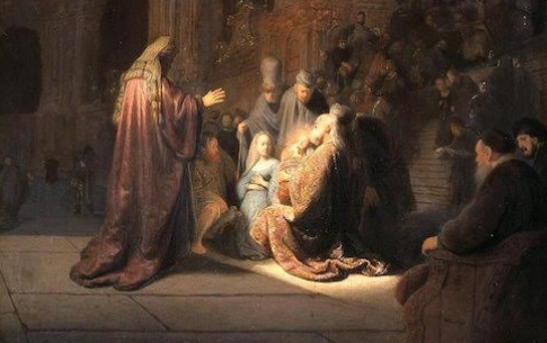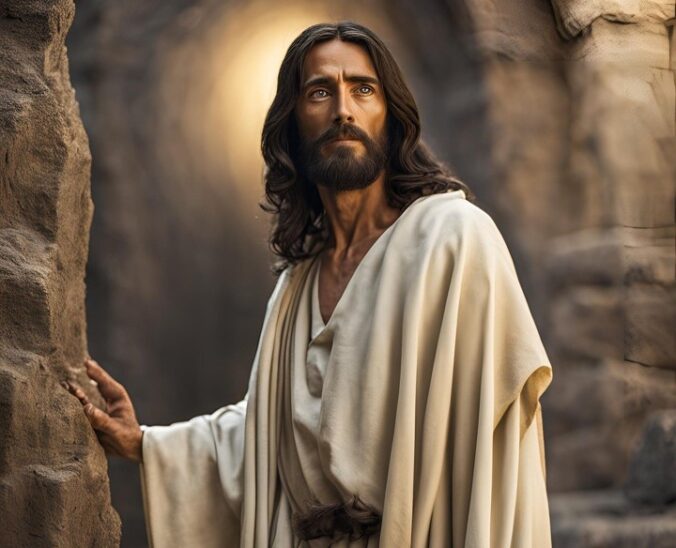At Mass yesterday, we read a beautiful story from the Gospel of Mark. Jesus’ public ministry is growing, and the crowds surrounding Him and the apostles are growing in size. The apostles are with Jesus, telling Him about the things they have been doing to assist in proclaiming the Good News.
Jesus and the apostles are weary. The demands and needs of the crowds are so great, there is not even always time for them to eat. This must have been quite a scene! Jesus suggests they all go to a deserted area, to rest for a bit. So they set off in a boat with Jesus, but otherwise by themselves.
Here’s what happens next:
“People saw them leaving and many came to know about it. They hastened there on foot from all the towns and arrived at the place before them. When He [Jesus] disembarked and saw the vast crowd, His heart was moved with pity for them, for they were like sheep without a shepherd; and He began to teach them many things.” Mark 6: 32-34
The story goes on to describe that, as the evening wears on, Jesus performs a miracle, turning five loaves of bread and two fish into enough food to feed five thousand people who have gathered to hear the teachings of Christ.
I treasure this story for two reasons. First, the story wonderfully depicts the depth of Jesus’ humanity. Jesus and the apostles are exhausted, but upon seeing the crowd waiting there, Jesus, who is moved with compassion, walks right back into the mass of people and begins listening to their questions and teaching them more about the Kingdom of God.
Jesus knows His time on earth is limited, and He does not want to squander even one opportunity to share the power and wonder of living and loving as God does. Jesus is trying to draw every soul that He can to the Father. He never tires of encouraging us to open our hearts to God. Jesus knows that when we allow God to enter our hearts and to make us good, we unleash the very power of God in our lives.
The Gospel story reiterates the metaphor of Jesus as the Good Shepherd, and it’s compelling. Jesus’ love and compassion, as He physically and spiritually feeds His flock, is on full display.
The second reason I love this story is because of the image it creates of people running to Jesus, and longing to hear more from Him. It must have been incredible to personally hear and observe Jesus teaching and engaging with the crowds. People are actively trying to discern:
“Is Jesus who He says He is? And if yes, what does this mean for my life? Do I trust in and follow Him? Or do I keep doing my own thing?”
There was an urgency to these questions, for they did not know how long Jesus would remain in their midst. Jesus was constantly moving around, during His three years of public ministry. People had to decide whether to adopt His teachings and to allow this new way of living to transform their lives.
The same urgency to decide about Jesus still exists today.
Jesus is no longer physically present among us, but the Holy Spirit is here, working through others and within our very own hearts, compelling us to decide whether or not we accept Jesus as the Son of God. But accepting Christ as the Son of God is merely the first step. We must also choose to allow Jesus to actively work in our hearts, and to transform the way we live.
Choosing the Christian life is not merely an intellectual exercise. C. S. Lewis describes things in this manner:
“The Christian thinks any good he does comes from the Christ-life inside him. He does not think God will love us because we are good, but that God will make us good because He loves us … When [Christians] speak of being ‘in Christ,’ or of Christ being ‘in them,’ this is not simply a way of saying that they are thinking about Christ or copying Him. They mean that Christ is actually operating through them; that the whole mass of Christians are the physical organism through which Christ acts — that we are His fingers and muscles, the cells of His body. … [This new life with Christ] is not merely the spreading of an idea; it is more like evolution.”1
But how do we recognize Jesus moving in our lives today? Why doesn’t God engage with us in more tangible ways? And why does God leave us to our own devices when it comes to deciding about whether to accept Jesus as the Son of God? C. S. Lewis posed similar questions:
“Why is God landing in this enemy-occupied world in disguise … why is He not landing in force, invading it?”2
Both the New and Old Testaments provide answers to these questions. God does not invade our lives and force us to follow and love Him because “God IS love … There is no love in fear. Perfect love casts out fear, because fear has to do with punishment. The one who fears is not made perfect in love.” 1 John 4: 16, 18
God wants us to choose to love Him out of our own free will — love cannot be forced or coerced.
Yes, God has a plan for our lives (Jeremiah 29: 11), but we can completely miss that plan if we are not paying attention. We can also choose to ignore the plan. A story about Moses in the Old Testament confirms this for us. When Moses leads the Jews out of 400 years of slavery in Egypt, he describes a Promised Land — a land of many resources and blessings.
Before they enter the Promised Land, God, through Moses, said the same thing to the people then that Jesus is still saying to us today: “I have set before you good and evil, life and death, and I am giving you a choice. If you obey God’s commandments, by loving Him and by walking in His ways, and by keeping His commandments, then you shall live and multiply, and the Lord your God will bless you. But if your heart turns away, and you will not hear, but choose to worship and serve other gods, you shall perish … therefore, choose life.” Deuteronomy 30: 15-19
When Jesus first entered our world, he entered quietly. Despite the crowds He drew near the end of his brief life, Jesus never forced anyone to follow Him. Before He left, Jesus told His apostles that He will return one day to claim His own:
“’But concerning that day or that hour, no one knows, not even the angels in heaven, nor the Son, but only the Father.’” (Mark 13: 32) “’You also must be ready, for the Son of Man is coming at an hour you do not expect.’” (Lk 12: 40)
St. Paul tells us that when Christ returns, we will all appear before Him. At that time, we will no longer be able to choose whether or not we believe Jesus is the Son of God. Instead, Jesus will consider the choices we have already made:
“For we will all stand before God’s judgment seat … each of us will give an account of himself to God.” Romans 14: 10, 12
God is purposefully holding back. He is not forcing us to believe in the goodness of Jesus because He wants us to choose to love Him, of our own free will.
Today, take the opportunity to choose. If you are struggling to believe in the promises of Christ, ask the Holy Spirit to help you. And if you have already chosen to believe in Jesus, ask the Holy Spirit to strengthen your belief.
Every day, no matter where you are in your journey, ask the Holy Spirit to open your heart more widely to the grace and wisdom and love that Jesus longs to provide each one of us.
“I wonder whether people who ask God to interfere openly and directly in our world realise what it will be like when He does. When that happens, it is the end of the world. When the author walks on the stage, the play is over. God is going to invade alright: but what is the good of you saying you are on His side then, when you see the whole natural universe melting away like a dream and something else — something it never entered your head to conceive — comes crashing in; something so beautiful to some of us and so terrible to others that none of us will have any choice left? From this time, it will be God without disguise … [and] that will not be the time for choosing: it will be the time when we discover which side we really have chosen, whether we realised it before or not.”3
Jesus loves you deeply. Always know that.
1C. S. Lewis, Mere Christianity (New York: HarperCollins Publishers, Inc., 1952), pages 63-64.
2Ibid, pages 64-65.
3Ibid, page 65.




Recent Comments